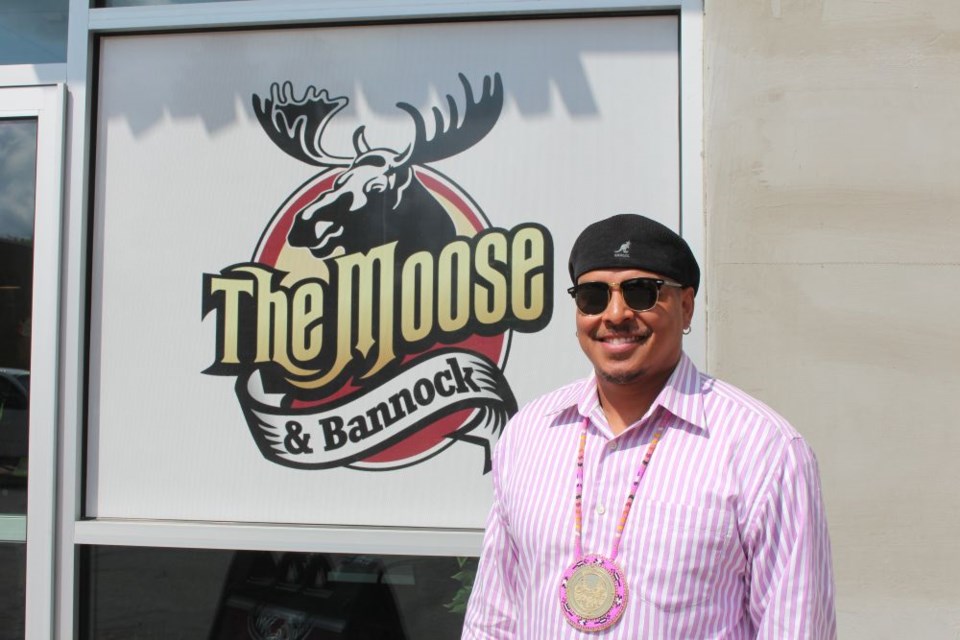YORKTON — The Zagime Anishinabek First Nation's Moose and Bannock is more than a restaurant — it’s a statement of identity, history and economic sovereignty.
Since opening, it has provided a space where Indigenous culture and cuisine converge, allowing people to connect over food while reclaiming an economic presence in Sask.
"It was just a matter of building out our business portfolio and getting a sense of what the market needs or what doesn't the market have. One of them was access to Indigenous cuisine," said Nathan Kaye, interim CEO of Zagime Management Authority Ltd, the corporate arm of the Zagime Anishinabek First Nation, on the creation of the restaurant.
Moose and Bannock serves bannock burgers, tacos and pizzas made up from different meats, including elk, bison, chicken, fish and beef. Bannock, in particular, carries historical significance dating back to the period before and after the signing of treaties.
"Prior to colonization, there was a form of breads that we made from our local plants that we had access to. It was based on your region and based on what the land provided," said Kaye, "for example, we used cattails."
Cattails — Typha, an aquatic plant—were ground into a fine powder that imitated flour. Indigenous people adapted their baking practices using available resources, long before the government issued flour and baking powder as rations.
Though bannock can be made using yeast, The Moose and Bannock integrates baking powder into their recipe to demonstrate the roots of where they came from, to help the community understand and to share Indigenous cuisine.
As well, Kaye said they are working towards serving bison supplied by their first nation.
"We have bison on the nation and we're working on getting that commercially graded so we can serve the bison that's from the nation right to the restaurant," said Kaye, adding, "being able to have that vertical integration opportunity for us to say, 'we raised the bison and we can also serve it as well.'"
Beyond the food itself, Kaye sees Moose and Bannock as part of a larger effort to reclaim Indigenous participation in the economy.
"I think there's the opportunity to really grow and develop and be a part of the economic playing field. Historically we've been excluded from these spaces so this is us reclaiming our place and expressing our identity," said Kaye.
"That's part of what the business and our business portfolio is—the objective is to create employment for our nation members and at the same time bring out who we are as Anishinabek people—being able to express ourselves through food and other business offerings," added Kaye.
Efforts to expand are already underway. While a franchise model may be a future possibility, the current focus is on strengthening the brand’s reach through catering services and events. The team is also considering launching a food truck to bring Indigenous cuisine to festivals and gatherings.
Additionally, Kaye said there are plans to use a commercially available bannock mix created by a Zagime Anishinabek First Nation member.
"We're going to be using [Dragon’s Den-featured entrepreneur] Rachel Smith’s bannock mix product (Bannock Express) throughout—making the bannock that we serve — but also offering her product to sell to people that wish to make bannock in their homes," said Kaye.
As Moose and Bannock continues to grow, community engagement remains central to its mission. In honour of National Indigenous Peoples Day on June 21, both locations — Yorkton and Regina — will offer special promotions to celebrate Indigenous heritage and bring people together over food.
Customers will receive 21 per cent off their meals when purchasing a meal and a fountain drink, and Indigenous Elders will receive 42 per cent off as a gesture of respect. Moose and Bannock is also collaborating with local Indigenous businesses to offer discounts to customers who spend $21 or more at partner locations, including Saulteaux Crossing Convenience Store and Esso in Regina, Omagakii in Regina or Yorkton and Zagime Mini Mart in Yorkton.
"Food brings people together," said Kaye, "it's a chance to learn about each other and each other's history as well. I think we can help build bridges and a brighter future by sharing our culture and our foods."

.png;w=120;h=80;mode=crop)


